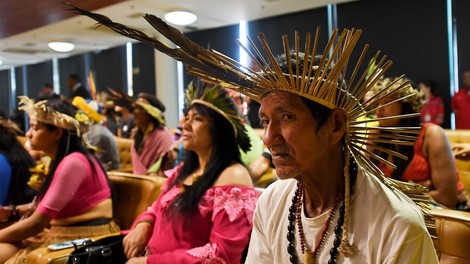Your podcast discovery platform
Curious minds select the most fascinating podcasts from around the world. Discover hand-piqd audio recommendations on your favorite topics.

piqer for: Climate and Environment
Pamela works as a Press & Communications Manager for an international NGO (IWGIA) defending indigenous peoples' rights. She holds an Erasmus Mundus MA in Journalism, Media & Globalisation from Hamburg and Aarhus University and an MA in Political Science from the University of Buenos Aires. She will be putting the eye on international media coverage of indigenous communities and their demands.
Turnover In Brazil: Supreme Court Rules In Favour Of Indigenous Peoples' Land Rights
“I want to go back home with our land rights clearly defined because my people are suffering,” explained one of the many indigenous peoples that last Wednesday celebrated a positive ruling of the Supreme Court in Brasilia.
In Brazil, 900 indigenous leaders have been killed for defending their lands since 2013. This threat comes hand in hand with a trend in national policy to ignore indigenous rights. Michel Temer has given clear signs of his take on indigenous demands. One of this has been the severe cuts at FUNAI, the national Institute promoting indigenous policies, which is now operating with 34 million USD less in its budget.
This intimidating political context aims at making structural changes to basic human rights on the ground. The government is now directly questioning land demarcation and restitution of land on indigenous hands.
While land ownership remains a key battle for indigenous peoples around the globe, Brazil’s Supreme Court ruling sets precedent in how to deal with such land disputes at a national level.
No place to reinterpret what has been conquered
Land demarcation has been vital for indigenous peoples in Brazil. This has allowed them to live in 704 collective lands in the Amazon region, which altogether represent 12% of Brazil’s territory. A collective right guaranteed by the constitution since 1988.
With this favorable legal framework, indigenous leaders have continuously protected their land rights. Today, representing only 0.4% the total population, indigenous peoples are standing strong to protect the last biodiverse lands from extractive industries.
Last month, Temer signed a recommendation to block the demarcation of any land on which indigenous people were not living by 1988. More than 700 requests have been sitting on the President’s desk in the last 16 months.
How will Brazil deal with the dilemma of economic growth and protection of indigenous rights? So far, Temer has made clear that he will not stand up for indigenous peoples.
